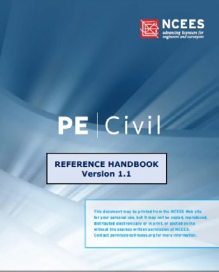Dr. Z’s Corner (202204)
April 1, 2022: Beginning of a New Era for Engineers Planning to Take the PE Civil Exam
 In this month’s article, we share ground-breaking news with our readers regarding the Principles and Practice of Engineering (PE) Civil exams. Starting April 1, 2022, The National Council of Examiners for Engineering and Surveying (NCEES) will be transitioning the PE Civil exams from pencil-and-paper (P&P) format to a computer-based (CBT) format.
In this month’s article, we share ground-breaking news with our readers regarding the Principles and Practice of Engineering (PE) Civil exams. Starting April 1, 2022, The National Council of Examiners for Engineering and Surveying (NCEES) will be transitioning the PE Civil exams from pencil-and-paper (P&P) format to a computer-based (CBT) format.
Initially, NCEES planned to complete the PE Civil exam’s transition to CBT format in 2023 but fast-tracked the change as part of its response to COVID-19. After the April 2020 penciland-paper exam administration was canceled because of the coronavirus pandemic. NCEES added an extra day to the October 2020 administration and began exploring the possibility of moving the PE Civil exam to CBT earlier than planned. The PE Civil exam was offered for the last time in penciland-paper format in October 2021.
Engineering students who passed the FE exams (students with EIT) should know about the Principles and Practice of Engineering (PE) exams. The PE exam basically tests for a minimum level of competency in any given particular engineering discipline. It is designed for engineers who have gained a minimum of four years’ post-college work experience in their discipline under a PE’s supervision (depending on state requirements).
The PE Civil exam in CBT format includes 80 questions. The total exam appointment time is 9 hours and it includes a non disclosure agreement (2 minutes), tutorial (8 minutes), actual exam (8 hours) and a scheduled break (50 minutes). For more information our readers may refer to the latest version of NCEES Examinee Guide at NCEES.org. All examinees are required to read this document before starting the exam registration process.
It is also important for our readers who are planning to take the PE Civil CBT exam to review the exam specifications, fees, requirements and the reference material. The new PE Civil Reference Handbook, Version 1.1 may be downloaded for free from NCEES website. To download, first register or log in to My NCEES and then go to Dashboard/Common Tasks/ Useful Documents/View reference handbooks.
The current version of the reference handbook will be supplied onscreen as a searchable PDF. All examinees will use a 24-inch monitor while testing to allow sufficient space to display both the exam question and the reference handbook. If codes, standards, or other references are being supplied, they will be listed on the last page of the exam specifications.
Typically, references are best viewed in the exam software at 100%. If additional clarification is needed, zooming to a higher or lower percentage may be helpful.
The exam fee for the new PE Civil CBT is $375 and is payable directly to NCEES. Some licensing boards may require filing a separate application and paying an application fee as part of the approval process to qualify for a seat. The examinee’s licensing board may have additional requirements as well. If you are planning to take the PE exam, familiarize yourself with your state licensing board’s unique registration procedures before registering for the exam.
Specifications and design standards
The PE Civil CBT exam is a breadth and depth examination. The breadth items cover topics from all five areas of civil engineering. The depth items focus more closely on a single area of practice. The PE Civil exam includes multiple-choice questions as well as Alternative Item Types (AITs).
For details on the format and length of the exam, the topics covered, and applicable design standards, select your engineering discipline below to download the exam specifications from NCEES’ web site, NCEES.org. PE exam specifications and design standards are posted 6 months before their effective date. Exam specifications change once every 5–7 years. Design standards change more frequently. The design standards for 2022 exams are listed below according to five civil engineering disciplines:
- Civil Eng: Construction
- Civil Eng: Geotechnical
- Civil Eng: Structural
- Civil Eng: Transportation
- Civil Eng: Water Resources and Environmental
Allowed reference materials
As mentioned earlier, the examinee will be provided with an electronic PE Civil Reference Handbook as well as all design standards specified for the chosen civil discipline during the exam. This handbook and the standards listed on the exam specifications are the only reference material that can be used during the exam.
The examinee will not be allowed to bring personal copies of any material into the exam room. Design standards are available through the publisher, typically as both an electronic and printed copy.
The handbook and design standards will be available for both the breadth and depth portions of the exam, though design standards are not needed for breadth questions. The NCEES handbook and the design standards used on the exam are searchable pdf files with linked chapters for easy navigation.
Finally, we have to remind our readers that both the FE and PE exams are very fast paced exams and you will have little time to look up information. Therefore, make sure you are familiar with your reference material and design standards. It will be helpful to begin with the subject areas you know best. This will give you more time and build your confidence.
Most importantly, stay relaxed and confident. During the exam, keep a good attitude and remind yourself that you are going to do your best!
Until next time,
Ahmet Zeytinci, P.E.
This email address is being protected from spambots. You need JavaScript enabled to view it.


